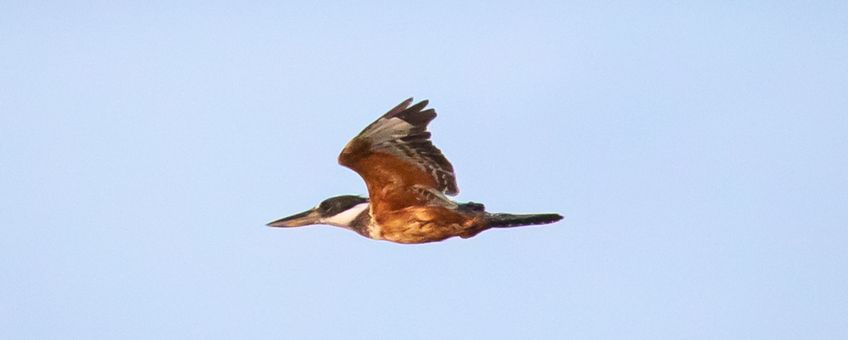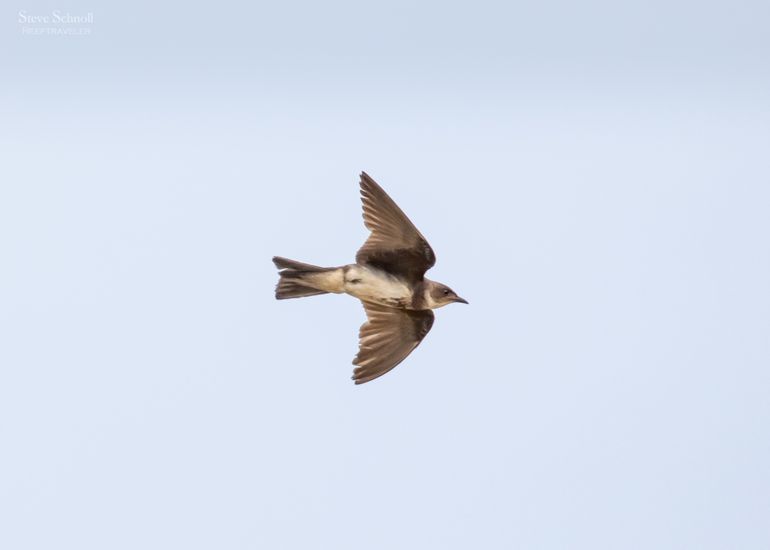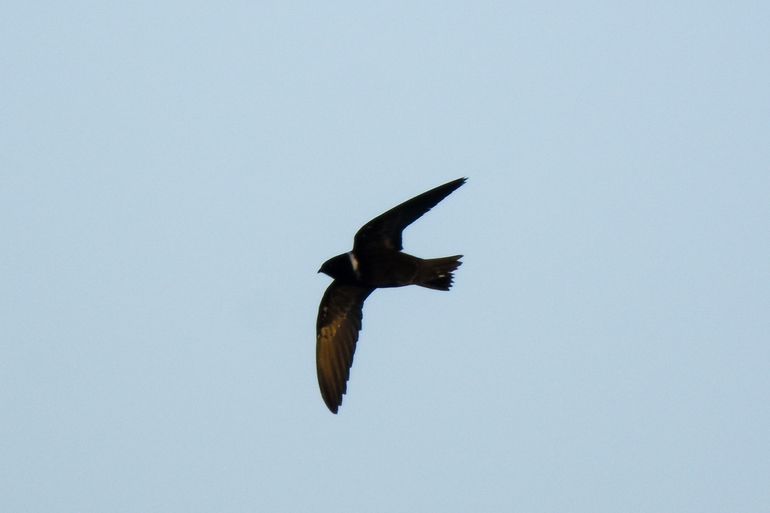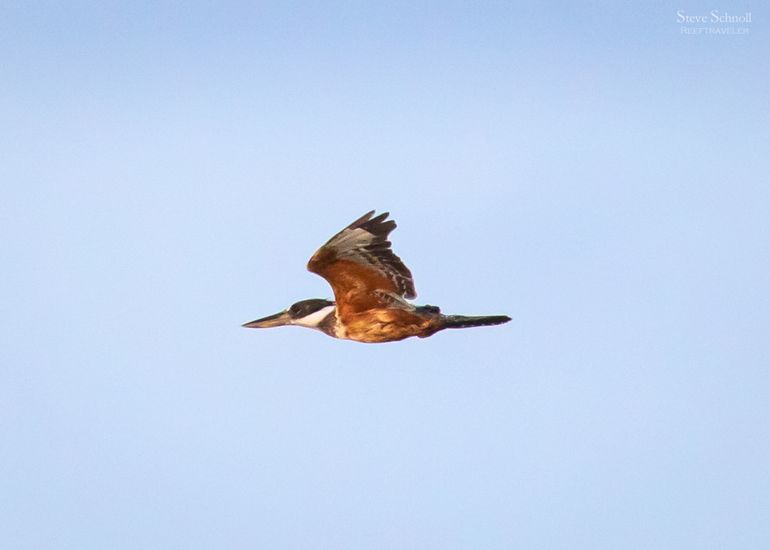
Three new bird species identified on Bonaire
Dutch Caribbean Nature Alliance (DCNA)The number of bird species recorded on Bonaire is growing each year. In 2016, three new species were identified, the Lesser black-backed gull, Pied water-tyrant and Dickcissel. Additionally, six new species were identified in 2017, Oilbird, Greater ani, Smooth-billed ani, Prairie warbler, Black vulture and Cory's shearwater. In 2018, an unexpected Crowned-slaty flycatcher from South America was the only new bird identified. The first records for each of these birds were described in the Dutch Caribbean Nature Alliance's free newsletter BioNews issues 11-2017 (pdf; 3.0 MB) and 19-2018 (pdf; 2.7 MB).
This article by Peter Paul Schets shortly details the three new species identified in 2019. The addition of these birds brings the total number of bird species recorded on Bonaire to 235.
Brown-chested martin
On June 7th 2019 Peter-Paul Schets noticed two large martins which flew in very fast, wide circles above Lac Cai. These birds flew for hundreds of meters very low, near the ground, a behavior which he had not seen before in Caribbean martins (a species not uncommon on Sint Eustatius and Saba). Due to the brown coloration of the bird’s backs Schets believed he had found Brown-chested martins. As the light was already poor, Schets was not able to take any decent photos. He sent resident birder and photographer Steve Schnoll a message and asked him if he could visit the location during the following day to photograph the birds. The next morning, Schnoll quickly found the two birds and was able to take several great photos. These proved the birds were in fact the Brown-chested martins (Progne tapera), a new bird for Bonaire. This species was recorded first on Aruba in 1993 and in June 2016 on Curaçao.
Two subspecies of Brown-chested martins occur in South America. Birds which belong to the migrating population fusca can be identified by a brown vertical line down from the broad brown band on their breast. The birds spotted on Bonaire belong to this subspecies, as can be seen in the photos of these birds. Southern winter birds of this migrating population travel as far north as northern parts of South America and Panama.

White-collared swift
On July 21 2019, Bonaire resident Martijn Hickmann was taking pictures of brown pelicans and terns at White Slave on the southwest coast of Bonaire. These birds were attracted to the area by the activities of fishermen at sea. Just before sunset Hickmann noticed a very different bird which had joined the terns. This bird seemed to be foraging by flying up and down, low over the surface of the water. Hickmann was able to take a few pictures of the bird. He thought a second one was foraging in the same way, further away, but was not certain. As Hickmann was not familiar with this bird, he put his pictures on Facebook. It did not take long before it was identified as the first White-collared swift (Streptoprocne zonaris) for Bonaire.
Interestingly enough, the first record for the ABC islands was only six weeks earlier, when Michiel Oversteegen, from Aruba, recorded (and photographed) a similar bird which flew over Bubali Bird Sanctuary. So far, this bird has not been recorded on Curaçao. White-collared swifts breed between southern Mexico and northern Argentina, in large parts of northern and central South America as well as within the Greater and some of the Lesser Antilles.

Ringed kingfisher
In July 2019, another new bird for the island was identified. On July 30th, local birder and photographer, Steve Schnoll, shortly saw a large kingfisher near the old saltpans of Lac Cai. At first, he nearly identified it as a Belted kingfisher, a common species for this location during migration and northern winter. However, the bird was much larger, had a huge bill and showed much more red on its belly. Fortunately, Schnoll was able to take some pictures within the few seconds he saw the bird. These pictures clearly show a female Ringed kingfisher (Megaceryle torquata). Schnoll was thrilled to have recorded a new bird for Bonaire.
Ringed kingfishers occur between southern Texas (USA) through Central and South America, as far south as Argentina and Chile. They also breed on some of the Lesser Antilles and on Trinidad. There are very few records of this species from Aruba and only one from Curaçao. Both islands had their first sightings in 1991.

Apart from these three new birds, 2019 proved to be an excellent year for rare and uncommon bird species on each of the ABC islands. Unusual bird sightings for Bonaire included several Striated herons, one female Ring-necked duck, two Hudsonian godwits, some Upland sandpipers, several Black skimmers, at least one Eastern kingbird, two Scarlet tanagers, one Summer tanager, at least four Indigo buntings, one male Common yellowthroat, a Connecticut warbler, a Black-and-white warbler and two Rose-breasted grossbeaks.
Have you observed birds?
Please report your sighting on the website Observation.org or download the free apps you can find on that website. This free website and free apps can be used not only by biologists but by all citizens to report any animals and plants and is available in more than forty languages. It is now also being translated to Papiamento. The species reports by local communities are very valuable for the nature conservation organization to learn and protect the species on our islands. For more information contact research@dcnanature.org.
More information
- New bird species Bonaire in 2016 and 2017 (pdf; 3.0 MB)
- New bird species Bonaire in 2018 (pdf; 2.7 MB)
Text: Peter Paul Schets
Photos: Steve Schnoll; Martijn Hickmann
